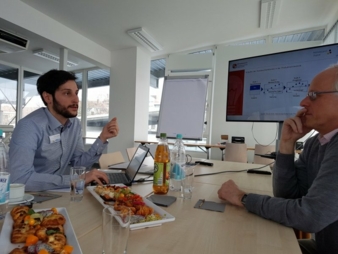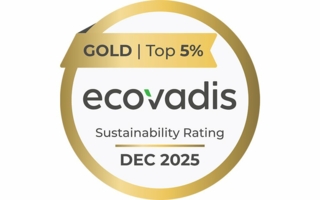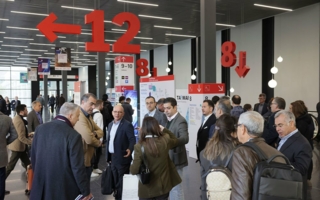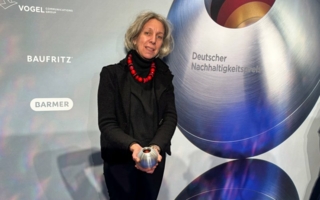28/05/2021 – Mittelstand 4.0 Competence-center Textil vernetzt in Aachen — auf Deutsch lesen
ITA: Expand the digital fitness in the companies
Successful projects and new offerings after three successful years. An overview by Frederik Cloppenburg and Thomas Gries, ITA.
The showcase in Aachen is located at the Institute for Textile Technology (ITA) of RWTH Aachen University. With the focus on “Work 4.0”, the Aachen location can map the textile manufacturing process on a fully networked process chain. The economic benefits of digitalised manufacturing can be experienced and experienced on this fully integrated production line, from the yarn to the finished, digital end product. Thanks to this competence, several projects have already been successfully implemented with partners from business and research.
The Mittelstand 4.0-Kompetenzzetrum Textil vernetzt was founded to support small and medium-sized enterprises (SMEs) from the textile industry and textile machinery manufacturing, as well as related areas, in the field of digitalisation. The declared goal: to expand the “digital fitness” (BMWi, 2021) of the companies. Since SMEs in this sector in particular are challenged by “small batch sizes and a constantly varying production character” (BMWi, 2021), the Mittelstand 4.0-Kompetenzzetrum Textil vernetzt provides assistance in integrating digital processes into everyday operations. This is achieved through various aspects of digitalised production, such as with the implementation of assistance systems or smart sensor technology in the production line. However, the training and qualification of employees is also an important component in achieving individual and networked production in the long term.
Textil vernetzt is present at several locations in Germany in order to always be available as a competent contact for companies as local as possible. This is also the case at the location in Aachen.
Some project examples:
Textile company Dibella
The warehouse logistics of the textile company Dibella were optimised. The problem was the large amount of time lost when reading article labels. Due to the stacking of rolls that were destined for making-up, the labels were covered and thus reading them was made much more difficult. To make the information needed more readily available to staff, the ITA proposed a solution using RFID chips. These are attached to the top of the rolls and contain important information about the item. After several company visits and workshops, the competence center Digital in NRW was won as support for logistics issues. Together, the project was successfully implemented.
Textile company Güth & Wolf
In order to make better use of the possibilities of IT solutions at the textile company Güth & Wolf GmbH, the Aachen competence center was consulted. The IT data is available, but there are no strategies to make the information usable in a digital production. In order to be able to improve the work processes, the ITA carried out a company analysis to review the different areas of the company. In this way, an impact analysis for the cost/benefit balance for digital investments will be prepared in the course of the measure. In order to make the advantages of digitalised production visible, Güth & Wolf was given a tour of its in-house digital production. After several workshops, the ITA was able to offer the company a sensible structural solution for the digitalisation of production processes.
Delta T Hitzeschutz und Isolation
For many companies, the focus is primarily on quality assurance of their own products. This was also the case at Delta T Hitzeschutz und Isolation GmbH. Press fasteners that were worked into the material proved to be problematic. As these sometimes proved to be defective, the buttons had to be checked and repaired manually. Since this work step requires a lot of effort, Delta T was looking for a solution. The ITA then developed methods to detect the rejects as quickly as possible with the help of various sensor technologies. These can then be repaired internally. The existing machines in the factory can be retrofitted with micro-sensor technology. In this way, the quality of the products can be improved with relatively little effort, but productivity can also be increased.
Gruschwitz Textilwerke
Together with all four partners of the Textile competence center, the ITA created a digital roadmap for Gruschwitz Textilwerke AG, which produces technical yarns in the Allgäu region. After the company has already invested in the modernisation of production and, among other things, in a lean management system in the past, the digitalisation of production is now on the agenda. The roadmap covers a broad spectrum of digital solutions and ranges across topics from digital engineering and smart sensor technology, to further training and qualification of employees, to networked production. The roadmap is intended to act as a roadmap for the next steps to introduce digital solutions in the company and was developed in workshops and discussions with employees and the competence center.
But the competence center in Aachen was also involved outside of the larger projects. In total, the competence center in Aachen was able to inform more than 90 SMEs with around 120 participants about the advantages of an intelligent process chain during more than 70 guided tours of its own digitized production by 2021 and thus educate them about its benefits. In total, however, more than 350 people were reached through the tours. However, a broad audience was also reached at 10 information events, which were attended by over 80 SMEs and almost 320 people.
The competence center project will be continued and expanded so that companies will also have the opportunity to turn to a competent partner in matters of digitisation in the textile industry in the future. On the one hand, the project will be extended for another two years and can thus serve as a sustainable contact for companies. On the other hand, the Aachen showcase will be extended to include the ITA’s main location. The technical center located there offers an even larger collection of production machines and will be extensively digitally retrofitted in the course of the extension. In addition, the Aachen competence center will also be able to support companies in the future with the implementation of applied artificial intelligence in everyday work, as the location has been included in the AI Trainer measure. The first implementation projects in this new thematic field are already being planned.
In order to keep the entry hurdle for companies as low as possible, the competence center has developed a five-step strategy for digitising the company. This strategy consists of informing, demonstrating, qualifying, designing and implementing. In order to integrate the individual companies into this strategy in the best possible way, the competence center in Aachen has developed eight starter formats to optimally cover the needs of each company.
The 4.0 maturity level format
The “4.0 maturity level” format is designed to determine the status quo of the Industry 4.0 maturity level of the respective company. In doing so, the digitalisation experts take a close look at both the data collection and the use of the data. By looking at the company’s structure, processes and development, the various areas of the company can be classified in terms of their Industry 4.0 maturity level. On this basis, the most important fields of action for the organisation can be derived.
Readiness Assessment
In order to be able to determine the modelling capability and thus the monetary usability of a company’s data, the Aachen location has developed the “Readiness Assessment” starter format. In the course of the format, data collection and use is assessed along the entire value creation process. From the raw material supplier to customer feedback. At the end of the assessment, the company receives a classification of the modelling capability and an overview of the most important fields of action for increasing data quality.
Guide for the Implementation of Smart Factory Concepts
The ITA has already developed the “Guide for the Implementation of Smart Factory Concepts” in completed projects. The aim of the guide is to increase effectiveness and efficiency by avoiding quality-relevant errors. The guideline is intended to support companies in determining the requirements for digital solution approaches. In the corresponding starter format, the guide is applied in the company and digital solutions for increasing the quality rate are identified.
Measurement Technology Workshop
To give companies an understanding of electrical measurement chains and their signal processing, the competence center in Aachen offers the “Measurement Technology Workshop”. In this interactive workshop, companies can acquire the right know-how on how sensor technology can be used profitably, but also how to select the right sensor technology for the corresponding measurement task. In addition, the ITA experts teach how the company can get from a physical observation to a usable measured value.
Potential Check Measurement Technology
With the format “Potential Check Measurement Technology”, the competence center offers a tool with which a company’s measurement ideas can be validated in the production environment. The measurement and digitisation technicians of the ITA check whether the desired effects can be recorded with a measurement value acquisition. For this purpose, the technicians install a self-sufficient measuring case in the production of the company in order to record measured values from the sensors and interfaces independently of the in-house control system. The company receives the recorded data after the measurement. Thus, in cooperation with the experts from Aachen, it can be analysed whether the targeted measurement concept works.
Digital Waste Walk
For the identification of profitable digitalisation approaches, companies can undergo the “Digital Waste Walk”. This format of the ITA consists of an introductory workshop in which the individual value drivers of production are identified. Afterwards, experts for digitalisation examine the company’s production in presence for one day. In the process, digitalisation opportunities are sought that increase the company’s value creation. Afterwards, the companies receive a list of useful digitalisation technologies that can be implemented in the short, medium and long term.
Work 4.0 Workshop
To get an overview of the possible applications of Work 4.0 technologies, companies can take part in the ITA’s “Work 4.0 Workshop”. The aim of this format is to discover the potential of using digital assistance systems in production. After the companies have received information about the current situation of the labour market in the textile sector, an introduction to digital assistance systems follows. The different levels of assistance functions will be shown to the companies in order to ultimately be able to present an approach for the methodical development and introduction of such systems.
AI Trainer
The topic of artificial intelligence is becoming increasingly important for the manufacturing textile industry. In order to optimally prepare the companies for this task, the ITA was included in the “AI Trainer” measure and has developed the “AI Starter” format in the course of this. The Aachen location supports the companies so that they can use their data profitably. The technical or non-technical requirements of AI-supported systems are determined on a needs-oriented basis so that they can be optimally used in production. To this end, the ITA supports companies in the analysis, conception and implementation of suitable methods.
Interested companies can obtain further information on the website of the Mittelstandskompetenzzentrum Textil vernetzt.
The ITA says thanks the Federal Ministry for Economic Affairs and Energy for funding the “Mittelstand 4.0-Kompetenzzentrum – Textil vernetzt” project as part of the “Mittestand digital” initiative.





